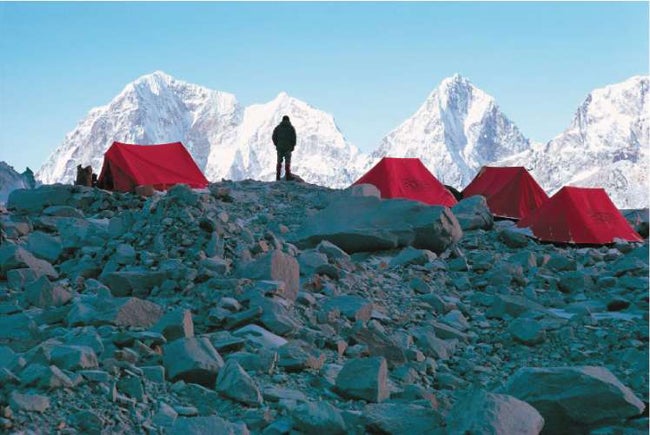A mountain of trash: China closes Everest for clean-up

Your support helps us to tell the story
From reproductive rights to climate change to Big Tech, The Independent is on the ground when the story is developing. Whether it's investigating the financials of Elon Musk's pro-Trump PAC or producing our latest documentary, 'The A Word', which shines a light on the American women fighting for reproductive rights, we know how important it is to parse out the facts from the messaging.
At such a critical moment in US history, we need reporters on the ground. Your donation allows us to keep sending journalists to speak to both sides of the story.
The Independent is trusted by Americans across the entire political spectrum. And unlike many other quality news outlets, we choose not to lock Americans out of our reporting and analysis with paywalls. We believe quality journalism should be available to everyone, paid for by those who can afford it.
Your support makes all the difference.Mount Everest, where the air is thin and climbing to the summit is a task to which few are equal, is a terrible place to organise a clean-up operation. But now China is planning to restrict access by climbers to the summit of what they call Mount Qomolangma to allow environmental teams to carry out a huge clean-up of the world's highest rubbish dump.
Just weeks after the Olympic torch relay across the planet's highest peak, mountaineers are planning to scale it to clear the mounds of discarded tins, cans, bottles, oxygen canisters, rucksacks and even the occasional corpse of a climber.
In 2007, 40,000 people visited Everest's Chinese northern side. While that is significantly fewer than the number that went up from the Nepali side to the south, they still managed to leave 120 tonnes of rubbish.
The Tibetan environmental protection agency wants to restrict access to Everest and clean up the northern foothills.
"We have a responsibility to ensure the water source of the river flowing from Everest to the sea is clean," said Zhang Yongze, the leader of the environmental group. "Our target is to keep even more people from abusing Mount Everest," he told the Xinhua news agency.
Everest's 29,035ft peak is on the border between China and Nepal and, in the 55 years since Sir Edmund Hillary and Tenzing Norgay first conquered it, thousands of climbers have visited the area, providing a significant source of income to both countries. But the routes have become hopelessly overcrowded, with every group of climbers leaving its own unmistakable footprint on the mountain.
The gruelling ascent, combined with deep snow, high altitude and thin air means that those who reach the summit tend to leave their gear up there to make the descent easier. The extreme cold prevents decomposition of most of the detritus. It is thought that there at least 120 frozen corpses on the mountain.
On the Nepali side, the government insists that climbers bring their gear back with them or risk losing a hefty financial deposit. No similar rule applies on the Chinese side.
There are sceptical voices about China's environmentalist claims, especially since – earlier this year – Beijing paved a road to Base Camp against the wishes of international conservationists and Tibetan independence activists who said it was the latest effort to dilute Tibetan culture in the region.
Jin Canrong, a professor at the Institute of International Relations at Beijing's Renmin University denied that, saying: "The cleaning work to Mount Everest is for environmental protection. But some Tibetan independence elements have given a political interpretation for acts of environmental protection."
Environmentalists say most of the rubbish that has accumulated on Everest is cosmetic and not a major problem, though the fact that climbers tear up the local shrub juniper to make fires is worrying because it can lead to soil erosion.
Smaller-scale clean-ups have been attempted before: the last such effort was in 2004, when a team of 24 volunteers removed eight tonnes of junk. In 2006, another cleaning expedition retrieved 1.3 tonnes of rubbish.
The planned Chinese campaign will take place in the first half of 2009 to protect the fragile ecology of the Himalayan plateau. The exercise is also aimed at preserving the melting Rongbuk glacier, which has retreated 490ft at the base of Everest in the past decade, Mr Zhang, the clean-up leader, said.
In May this year, Chinese authorities limited the climbing season, convincing the Nepali government to shut down the southern approach to Everest for several days to make sure there was no disruption of the politically sensitive Olympic torch relay.
Tibetan activists accused Beijing of using the relay to symbolise its control over Tibet. For China, Tibet is, was and always will be Chinese. Mr Zhang described the Olympic expedition as a model of environmental responsibility, saying climbers, support crews and media carried away large amounts of garbage and relied on "environmental lavatories" to avoid fouling the mountain.
Join our commenting forum
Join thought-provoking conversations, follow other Independent readers and see their replies
Comments